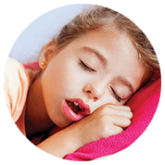Mouth-Body Connection
Your mouth-body connection is the gateway to your health. The oral-systemic link tells us how teeth diseases affect your whole body, and vice versa. The human microbiome begins in the mouth and continues through your digestive system. It sounds crazy, but bacteria in the digestive system can affect the health of your teeth. The mouth-body connection also shows us the problems caused by oxygen deprivation. The first sign of a lack of oxygen may be seen in your dental health. Sleep disorders, snoring, sleep apnea symptoms and a blocked sinus can all begin in the mouth. The oral-systemic link shows how teeth diseases, healthy digestion and sleep disorders all begin with the same problem. Everything starts with your dental health.

Avoiding Mouth Breathing for Better Future Health
Regularly breathing through the mouth instead of the nose can lead to a wide range of issues. It dries out the mouth and teeth, leading to bad breath and contributing to decay of the enamel and gums. It causes poor jaw positioning, which then causes pain in the jaw and grinding of the teeth, which in turn leads to damage. It can also affect speech and, over time, lead to malocclusion, requiring orthodontic correction.
Mouth breathing is believed to interfere in optimal jaw development. Children’s faces need to grow forward in order for them to have a fully grown open airway. Certain types of orthodontic treatment stunt the growth of children’s faces, and, as a result, these children end up with disrupted breathing and sleep apnea for the rest of their lives.
Understanding the Danger of Mouth Breathing
Mouth breathing is not the same as nasal breathing and often further compromises the airway. Mouth breathing:
- Can be a contributing factor to a compromised airway in patients who require orthodontic treatment.
- Impedes the proper exchange of carbon dioxide and oxygen.
- Prevents the proper function of the tongue and other orofacial muscles that children need to speak, swallow, chew, and function properly.
- Can cause the delicate tissues of the tonsils and adenoids to swell and become enlarged, further impacting a restricted airway.
Breathing Techniques
The Foundation for Airway Health believes mouth breathing is one of the most visible signs of an airway disorder. Now, a new study presents the benefits of nasal breathing during exercise. The Washington Post’s Wellness Perspective explains this in the article “Could Nasal Breathing Improve Athletic Performance?” Says author Jae Berman, “The nose is built with a specific purpose: to support our respiratory system (the primary purpose of the mouth, on the other hand, is to start the digestive process). The nostrils, hair and nasal passageways are designed to assist in filtering allergens and foreign bodies from entering the lungs. The nose also adds moisture and warmth to inhaled air for smoother entry to the lungs.”
Without proper tongue placement when sleeping, the jaw drops back and takes the tongue with it, which leads to snoring, swollen tonsils or adenoids, tooth decay, bed wetting, restless sleep, delayed or arrested growth, chronic allergies, eczema, asthma, depression, headaches, and the appearance of ADD/ADHD type of behavior. Children without proper REM sleep and lack of the necessary oxygen to their brain while sleeping have trouble in academic subjects such as spelling, math and science.

Orthodontic appliance therapy has shown great promise in helping retrain patients to proper breathing and swallowing practices. By improving physical function through slight repositioning of the jaw patients have seen an improvement in sleep disordered breathing and poor head posture as well as received relief from headaches and muscle pain caused by poor craniofacial development. Treatment plans include working with specialists, including myofunctional, craniofacial and physical therapists as well as ENT doctors to improve patients’ health.
Watch the following videos for more information:

Don’t delay! Call us now at 703-237-7622 to schedule your next preventative visit, or to ask us any questions about your routine care.
